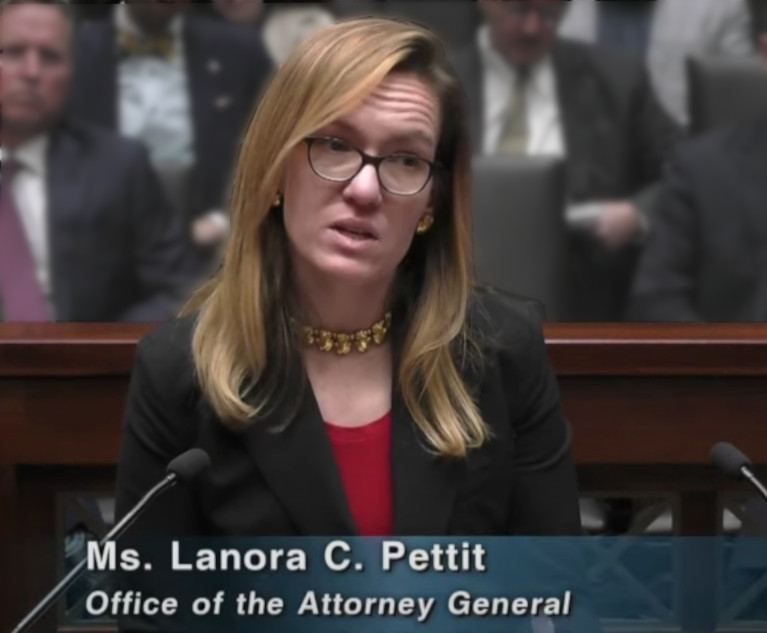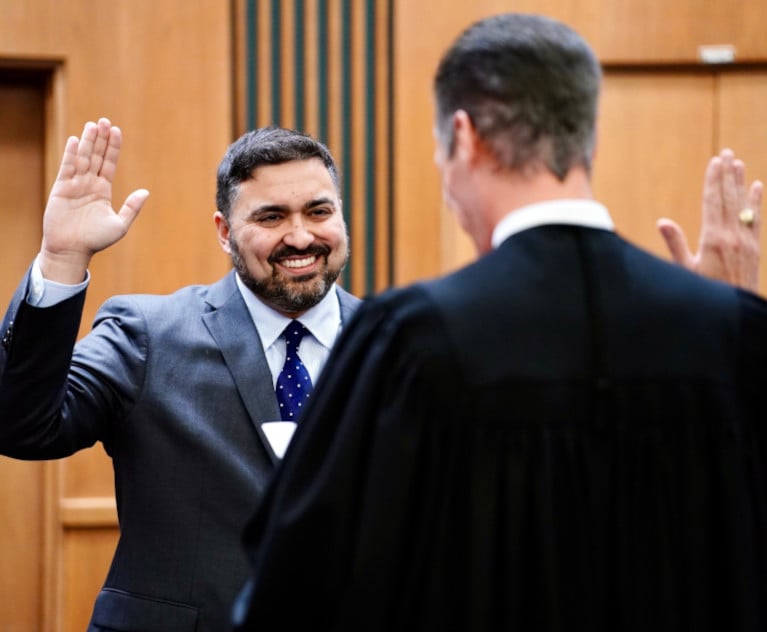There's a Courtroom Fight Brewing That Could Affect Texas Voters
The ruling means the defendants must keep fighting to defend the constitutionality of the state's ballot access laws for minor party and independent candidates, but also, the plaintiffs will have to meet a Dec. 9 deadline to pay filing fees or submit voter petitions.
November 26, 2019 at 01:54 PM
4 minute read
 Photo: Elijah Nouvelage/Bloomberg
Photo: Elijah Nouvelage/Bloomberg
In a lawsuit over ballot access laws in the state of Texas, minority political parties on one side and the state of Texas on the other both scored one victory and one defeat in a Monday court order.
The ruling means the defendants must keep fighting to defend the constitutionality of the state's ballot access laws for minor party and independent candidates, but also, the plaintiffs will have to meet a Dec. 9 deadline to pay filing fees or submit voter petitions if they want their candidates on the 2020 ballot.
Judge Robert Pitman of the U.S. District Court for the Western District of Texas in Austin denied the state defendants' request to dismiss the claims. But simultaneously, the court denied the plaintiffs' request for a preliminary injunction to stop a new law that imposed on minor party candidates and independents the same requirements as Republicans or Democrats regarding paying filing fees or submitting a petition in lieu of paying filing fees.
The case is Miller v. Doe. A July 25 amended petition by the plaintiffs—America's Party of Texas, the Constitution Party of Texas, the Green Party of Texas and the Libertarian Party of Texas and six of their leaders or candidates—alleged that for 50 years, the state of Texas has used taxpayer funds to guarantee ballot access to the Republican and Democratic parties while imposing great burdens on minority parties and independent candidates to get on the ballot.
On the other side, the defendants argued in an Aug. 8 motion to dismiss that ballot-access laws serve an important state interest in streamlining the ballot and reducing voter confusion.
Related story:
Big Law Pro Bono Counsel Backs Texas Ballot-Access Lawsuit
According to the court's Nov. 22 order, the defendants' had claimed the plaintiffs didn't have standing to challenge ballot access requirements for independents. The court disagreed. It found that because plaintiff Mark Miller intended to run as an independent, he would have standing to sue over ballot access laws for independents. The other plaintiffs had standing since they claimed they wanted to vote for independent candidates, the court ruled.
Pitman also rejected the defendants' arguments that past case law had already upheld the constitutionality of the challenged laws. The plaintiffs were challenging a new ballot access law and a statutory scheme as a whole that didn't exist in the caselaw, said the opinion.
The court's rejection of the dismissal arguments is a victory for the plaintiffs, however, they also saw a defeat by losing a request for a preliminary injunction.
They wanted the court to block a 2019 law that made minor parties' candidates meet the same requirements as major party candidates to pay filing fees or submit petitions instead of paying fees. The Secretary of State's office implemented administrative rules to enforce the new statute, including imposing a Dec. 9 deadline, to which the plaintiffs objected.
Here, the court took up the defendants' argument, ruling that the statute was silent on the deadline, and it was appropriate for the administrative rules to fill in the blanks.
The new law was effective Sept. 1 and imposed a Dec. 9 deadline to pay fees or submit petitions. Imposing the new requirement so late in the election cycle violated the minor parties' due process rights, the plaintiffs claimed. Pitman rejected the argument after finding the plaintiffs hadn't shown a likelihood of success on the claim, and that the state had showed the law may serve a state interest.
Pro bono plaintiffs attorney David Whittlesey, partner in Shearman & Sterling in Austin, wrote in an email that he's pleased with the ruling because his clients will now get their day in court.
"We look forward to presenting evidence demonstrating the severe burdens that Texas's ballot access laws impose, which not only violate our clients' constitutional rights, but harm all Texas voters by restricting their choices at the ballot box," Whittlesey said. "Our request for preliminary relief concerned only one discrete aspect of the case — the new requirements that Texas enacted in 2019 — and its denial does not impact the case going forward."
Kayleigh Date, a spokeswoman for the Texas Office of the Attorney General, which is representing the defendants, declined to comment.
Read the ruling:
This content has been archived. It is available through our partners, LexisNexis® and Bloomberg Law.
To view this content, please continue to their sites.
Not a Lexis Subscriber?
Subscribe Now
Not a Bloomberg Law Subscriber?
Subscribe Now
NOT FOR REPRINT
© 2025 ALM Global, LLC, All Rights Reserved. Request academic re-use from www.copyright.com. All other uses, submit a request to [email protected]. For more information visit Asset & Logo Licensing.
You Might Like
View All


Trending Stories
- 1Thursday Newspaper
- 2Public Notices/Calendars
- 3Judicial Ethics Opinion 24-117
- 4Rejuvenation of a Sharp Employer Non-Compete Tool: Delaware Supreme Court Reinvigorates the Employee Choice Doctrine
- 5Mastering Litigation in New York’s Commercial Division Part V, Leave It to the Experts: Expert Discovery in the New York Commercial Division
Who Got The Work
J. Brugh Lower of Gibbons has entered an appearance for industrial equipment supplier Devco Corporation in a pending trademark infringement lawsuit. The suit, accusing the defendant of selling knock-off Graco products, was filed Dec. 18 in New Jersey District Court by Rivkin Radler on behalf of Graco Inc. and Graco Minnesota. The case, assigned to U.S. District Judge Zahid N. Quraishi, is 3:24-cv-11294, Graco Inc. et al v. Devco Corporation.
Who Got The Work
Rebecca Maller-Stein and Kent A. Yalowitz of Arnold & Porter Kaye Scholer have entered their appearances for Hanaco Venture Capital and its executives, Lior Prosor and David Frankel, in a pending securities lawsuit. The action, filed on Dec. 24 in New York Southern District Court by Zell, Aron & Co. on behalf of Goldeneye Advisors, accuses the defendants of negligently and fraudulently managing the plaintiff's $1 million investment. The case, assigned to U.S. District Judge Vernon S. Broderick, is 1:24-cv-09918, Goldeneye Advisors, LLC v. Hanaco Venture Capital, Ltd. et al.
Who Got The Work
Attorneys from A&O Shearman has stepped in as defense counsel for Toronto-Dominion Bank and other defendants in a pending securities class action. The suit, filed Dec. 11 in New York Southern District Court by Bleichmar Fonti & Auld, accuses the defendants of concealing the bank's 'pervasive' deficiencies in regards to its compliance with the Bank Secrecy Act and the quality of its anti-money laundering controls. The case, assigned to U.S. District Judge Arun Subramanian, is 1:24-cv-09445, Gonzalez v. The Toronto-Dominion Bank et al.
Who Got The Work
Crown Castle International, a Pennsylvania company providing shared communications infrastructure, has turned to Luke D. Wolf of Gordon Rees Scully Mansukhani to fend off a pending breach-of-contract lawsuit. The court action, filed Nov. 25 in Michigan Eastern District Court by Hooper Hathaway PC on behalf of The Town Residences LLC, accuses Crown Castle of failing to transfer approximately $30,000 in utility payments from T-Mobile in breach of a roof-top lease and assignment agreement. The case, assigned to U.S. District Judge Susan K. Declercq, is 2:24-cv-13131, The Town Residences LLC v. T-Mobile US, Inc. et al.
Who Got The Work
Wilfred P. Coronato and Daniel M. Schwartz of McCarter & English have stepped in as defense counsel to Electrolux Home Products Inc. in a pending product liability lawsuit. The court action, filed Nov. 26 in New York Eastern District Court by Poulos Lopiccolo PC and Nagel Rice LLP on behalf of David Stern, alleges that the defendant's refrigerators’ drawers and shelving repeatedly break and fall apart within months after purchase. The case, assigned to U.S. District Judge Joan M. Azrack, is 2:24-cv-08204, Stern v. Electrolux Home Products, Inc.
Featured Firms
Law Offices of Gary Martin Hays & Associates, P.C.
(470) 294-1674
Law Offices of Mark E. Salomone
(857) 444-6468
Smith & Hassler
(713) 739-1250







